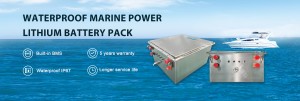Can I Use Lithium Battery For Boat Motor?
As the demand for more efficient and reliable power solutions grows, many boat owners are turning to lithium batteries for their boat motors. This article will explore the benefits, considerations, and best practices for using a lithium boat battery, ensuring you make an informed decision for your marine adventures.
Why Choose a Lithium Boat Battery?
1. Superior Energy Density:
Lithium batteries, particularly lithium iron phosphate (LiFePO4) batteries, offer a higher energy density compared to traditional lead-acid batteries. This means they can store more energy in a smaller and lighter package, making them ideal for boat motors where space and weight are critical factors.
2. Longer Lifespan:
One of the most significant advantages of lithium boat batteries is their extended lifespan. While lead-acid batteries typically last 300-500 cycles, lithium batteries can last up to 2000-5000 cycles, depending on usage and maintenance. This longevity translates to fewer replacements and lower long-term costs.
3. Faster Charging:
Lithium batteries can be charged at a much faster rate than lead-acid batteries. This is particularly beneficial for boat owners who need to recharge their batteries quickly between uses. A lithium boat battery can often be charged to 80% capacity in just a few hours, allowing you to get back on the water sooner.
4. Consistent Power Output:
Lithium batteries provide a more consistent power output throughout their discharge cycle. Unlike lead-acid batteries, which can experience a significant drop in voltage as they discharge, lithium batteries maintain a steady voltage, ensuring your boat motor runs smoothly and efficiently.
Considerations for Using Lithium Batteries for Boat Motors
1. Initial Cost:
While lithium boat batteries offer numerous benefits, they come with a higher upfront cost compared to lead-acid batteries. However, the long-term savings from their extended lifespan and reduced maintenance can offset this initial investment.
2. Compatibility:
Before switching to a lithium boat battery, it’s essential to ensure compatibility with your boat’s motor and electrical system. Some older boat motors may require modifications or additional components to work correctly with lithium batteries. Consulting with a marine electrician or the motor manufacturer can help you determine the best course of action.
3. Charging System:
Lithium batteries require a specific charging system designed for their chemistry. Using an incompatible charger can damage the battery and reduce its lifespan. Ensure you have a lithium-compatible charger and follow the manufacturer’s guidelines for charging and maintenance.
4. Safety:
While lithium batteries are generally safe, they can pose a risk if not handled correctly. It’s crucial to follow proper installation, charging, and storage procedures to prevent issues such as overheating or short-circuiting. Many lithium boat batteries come with built-in Battery Management Systems (BMS) that monitor and protect the battery from potential hazards.
Best Practices for Using Lithium Boat Batteries
1. Proper Installation:
Ensure your lithium boat battery is securely installed and well-ventilated. Avoid placing the battery in areas prone to excessive heat or moisture, as these conditions can affect its performance and lifespan.
2. Regular Maintenance:
While lithium batteries require less maintenance than lead-acid batteries, it’s still essential to perform regular checks. Monitor the battery’s voltage, temperature, and overall condition to ensure it remains in optimal working order.
3. Storage:
If you plan to store your boat for an extended period, ensure the lithium battery is charged to around 50% capacity and disconnected from the motor. Store the battery in a cool, dry place to prevent degradation.
4. Monitoring:
Many modern lithium boat batteries come with Bluetooth or other wireless monitoring capabilities. Utilize these features to keep track of your battery’s health and performance, allowing you to address any issues promptly.
Switching to a lithium boat battery can offer numerous benefits, including higher energy density, longer lifespan, faster charging, and consistent power output. However, it’s essential to consider factors such as initial cost, compatibility, and proper maintenance to ensure you get the most out of your investment. By following best practices and staying informed, you can enjoy a more efficient and reliable power solution for your boat motor, enhancing your overall boating experience.
For more industry and product information, please contact us:
WhatsAPP/Tel: +86-18100835727
Email: support@voltupbattery.com
Post time: Sep-24-2024










